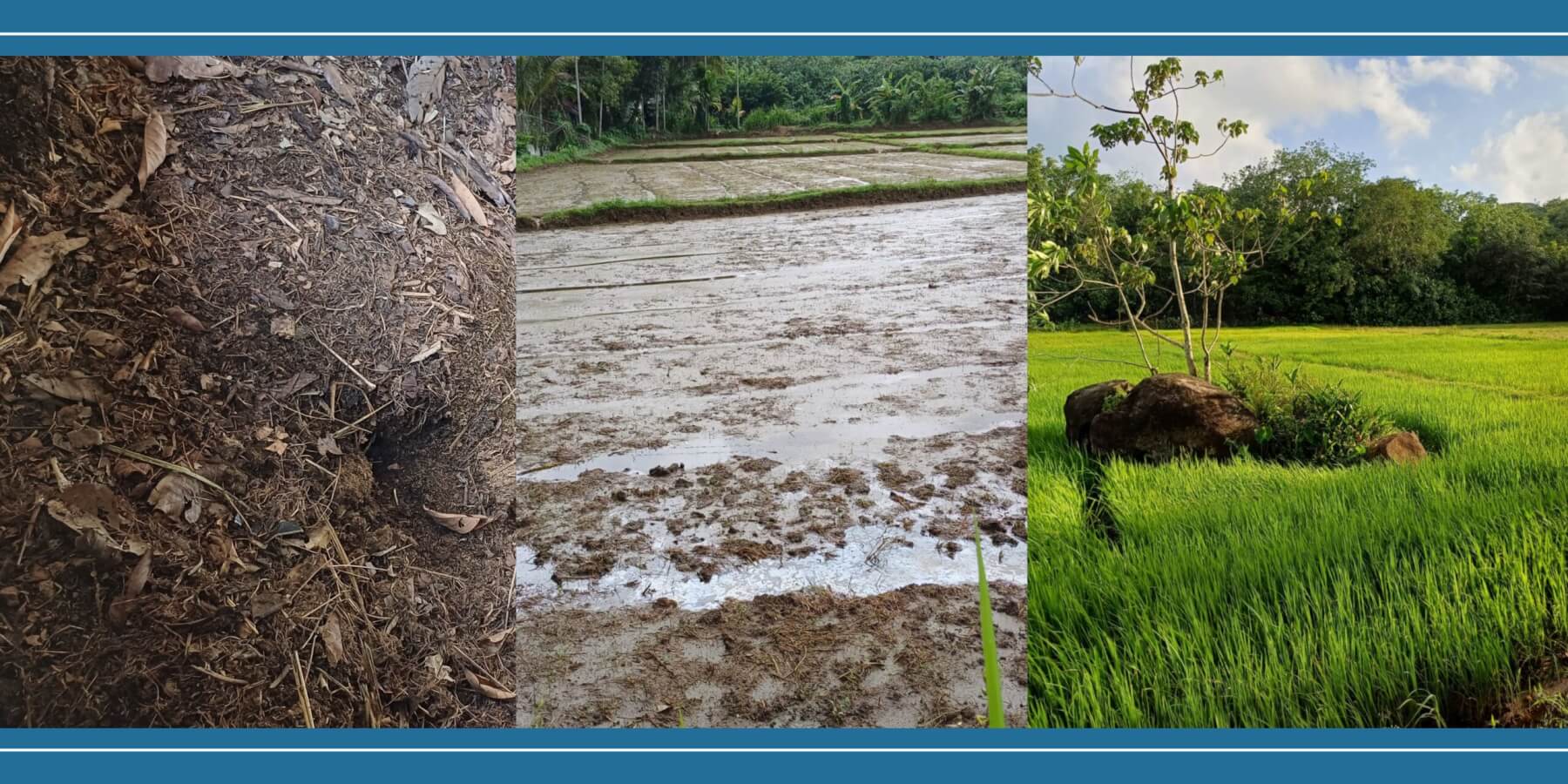
Impact of Organic Agriculture on Environmental Sustainability in Sri Lanka
Organic agriculture is increasingly being recognized as a sustainable alternative to conventional farming. It emphasizes the use of natural inputs and processes to enhance agricultural productivity while preserving the environment. In Sri Lanka, a country rich in biodiversity and natural resources, the shift towards organic farming is seen as a vital step in ensuring long-term environmental sustainability.
The role of agroecology.
Agroecology, which emphasizes ecological principles in farming, ensures that farmers work in harmony with nature. This includes techniques such as crop rotation, intercropping, and composting, which help to maintain soil health, conserve water, and promote biodiversity. The shift from conventional farming to organic methods reduces soil erosion, limits water pollution from chemical runoff, and increases the organic matter in the soil, which is crucial for sustainable food production.
Sri Lanka’s adoption of agroecological organic agriculture also benefits biodiversity. Chemical pesticides and fertilizers disrupt ecosystems and harm beneficial organisms. Organic farming, by using natural pest control methods and fostering diverse cropping systems, supports a healthier environment, enabling local wildlife, pollinators, and beneficial insects to thrive.
Furthermore, agroecological organic farming helps mitigate climate change by reducing the carbon footprint associated with agriculture. The use of organic fertilizers, instead of synthetic ones, lowers greenhouse gas emissions. Agroforestry and other agroecological techniques also contribute to carbon sequestration, capturing more carbon dioxide from the atmosphere.
Biodiversity and Organic Agriculture
Biodiversity refers to the variety of life in a particular habitat or ecosystem. It is a key indicator of the health and stability of an environment. Organic agriculture contributes to biodiversity in several ways.
- Habitat Preservation: Unlike conventional farming, which often involves the clearing of large tracts of land for monoculture, organic farming practices encourage the preservation of natural habitats. The use of crop rotations, intercropping, and agroforestry helps to maintain a diverse ecosystem. For example, the traditional “chena” farming in Sri Lanka involves a rotational system that allows the forest to regenerate, supporting a wide range of species.

Chenna Farming in Sri Lanka © Renaissance Sri Lanka
2. Reduction of Chemical Inputs: Organic farming prohibits the use of synthetic pesticides and fertilizers, which are known to harm non-target species, including beneficial insects, birds, and aquatic life. By minimizing chemical inputs, organic farming helps to protect the biodiversity of surrounding ecosystems. The organic tea plantations in Sri Lanka supported a higher diversity of insects and birds compared to conventional plantations.
3. Pollinator Health: Pollinators such as bees play a crucial role in the reproduction of many crops. The decline in pollinator populations due to pesticide use is a significant concern in conventional agriculture. Organic farming practices, by avoiding harmful pesticides, help to protect pollinators and ensure the continued availability of ecosystem services they provide. In Sri Lanka, organic farms have been shown to support higher populations of pollinators, contributing to better crop yields and overall biodiversity.
Soil Health and Organic Agriculture
Soil health is critical to agricultural productivity and environmental sustainability. Healthy soils are rich in organic matter, have good structure, and support diverse microbial communities. Organic agriculture positively impacts soil health in several ways.
- Organic Matter Content: Organic farming practices emphasize the use of compost, green manures, and cover crops, all of which add organic matter to the soil. Increased organic matter improves soil structure, water retention, and nutrient availability. Sri Lanka showed that organic paddy fields had significantly higher organic matter content and better soil structure compared to conventionally managed fields.
- Soil Microbial Activity: The use of natural inputs in organic farming supports a diverse and active soil microbial community. These microorganisms play a vital role in nutrient cycling, decomposition of organic matter, and suppression of soil-borne pathogens. Sri Lanka has shown that organic farming practices lead to higher microbial biomass and enzyme activity in soils, contributing to improved soil fertility and crop health.
- Erosion Control: Soil erosion is a major environmental issue in Sri Lanka, particularly in hilly regions. Organic farming practices, such as the use of cover crops, contour planting, and reduced tillage, help to protect the soil from erosion. By maintaining ground cover and improving soil structure, organic farming reduces the loss of topsoil and the associated degradation of land resources.

Leftover paddy harvest enriches the soil with more nutrients © Renaissance Sri Lanka
Water Resources and Organic Agriculture
Water is a critical resource for agriculture, and its sustainable management is essential for environmental sustainability. Organic farming practices contribute to the protection and efficient use of water resources in several ways.
- Reduced Water Pollution: The use of synthetic fertilizers and pesticides in conventional farming often leads to the contamination of water bodies through runoff and leaching. This can result in the eutrophication of lakes and rivers, harming aquatic life and reducing water quality. Organic farming, by eliminating these chemical inputs, reduces the risk of water pollution. The organic farming practices in Sri Lanka’s vegetable-growing regions resulted in lower levels of nitrate and pesticide residues in nearby water bodies compared to conventional farms.
- Improved Water Retention: Soils rich in organic matter have better water-holding capacity, which is particularly important in regions prone to drought. Organic farming practices, by increasing soil organic matter, help to improve water retention and reduce the need for irrigation. In Sri Lanka, where water scarcity is a growing concern, organic farming can contribute to more resilient agricultural systems by enhancing soil moisture retention.
- Sustainable Water Use: Organic farming encourages the use of water-saving practices, such as drip irrigation and mulching, which help to reduce water consumption. By optimizing water use, organic farming contributes to the sustainable management of water resources. In Sri Lanka, the adoption of organic farming practices has been associated with more efficient water use, particularly in regions where water is scarce.

Effective water management in paddy cultivation © Renaissance Sri Lanka
Challenges and Opportunities
While organic agriculture offers significant environmental benefits, there are also challenges to its widespread adoption in Sri Lanka. These include the need for greater awareness and education among farmers, access to organic inputs, and the development of markets for organic products. However, there are also opportunities to expand organic farming in Sri Lanka, particularly through government support, certification programs, and the growing demand for organic products both domestically and internationally.
Renaissance Sri Lanka’s Role in Cultivating an Agroecological Farming Culture in Sri Lanka
Renaissance Sri Lanka has the potential to significantly contribute to the development of sustainable agroecological organic agriculture in Sri Lanka. By promoting farmer education, establishing cooperatives, supporting the development of agroecological products, and encouraging climate resilience and biodiversity conservation, Renaissance Sri Lanka can play a transformative role in the country’s agricultural landscape (Read More). Through these efforts, Renaissance Sri Lanka can help create a more sustainable, equitable, and environmentally conscious agricultural system that benefits both farmers and the planet.
- Supporting the Development of Agroecological Products
Agroecological organic farming emphasizes the importance of producing high-quality, environmentally friendly products that are free from synthetic chemicals. Consumers, both locally and globally, are increasingly seeking out organic products due to their health benefits and lower environmental impact.
Renaissance Sri Lanka can help farmers develop value-added products such as organic teas, spices, dried fruits, and herbal remedies, (Read More) which are rooted in Sri Lanka’s agricultural heritage. By facilitating access to markets, providing branding and marketing support, and promoting the agroecological values behind these products, Renaissance Sri Lanka can ensure that farmers receive fair compensation for their efforts, while raising awareness about the importance of organic agriculture (Read More).
- Encouraging Climate Resilience and Biodiversity Conservation
Climate change poses a significant threat to Sri Lanka’s agriculture, particularly as farmers face challenges like unpredictable rainfall patterns, droughts, and floods. Agroecology offers a solution by promoting farming practices that enhance resilience to these climate-related risks. Renaissance Sri Lanka can work with communities to implement practices such as agroforestry, intercropping, and the use of drought-resistant local crop varieties.
These practices reduce the vulnerability of farming systems to extreme weather and contribute to biodiversity conservation. By encouraging the preservation of indigenous seeds and the protection of natural habitats, Renaissance Sri Lanka can help restore and maintain the ecological balance necessary for sustainable farming. Biodiversity, particularly in terms of diverse plant and animal species, plays a crucial role in ensuring the health and productivity of agroecological systems.
- Fostering Women’s Empowerment in Sustainable Agriculture
Women play a central role in Sri Lankan agriculture, particularly in small-scale farming. Renaissance Sri Lanka’s initiatives can be designed to specifically target women farmers, empowering them to adopt agroecological organic farming practices. By offering training and support for women to lead in the production of organic products, RSL can help foster economic independence and promote gender equality in rural communities (Read More).
Conclusion
Organic agriculture has a profound impact on environmental sustainability in Sri Lanka, particularly in terms of biodiversity, soil health, and water resources. By promoting practices that enhance biodiversity, improve soil health, and protect water resources, organic farming offers a sustainable alternative to conventional agriculture. The continued expansion of organic farming in Sri Lanka holds the promise of not only improving environmental sustainability but also enhancing the livelihoods of farmers and the well-being of communities.
References
Fernando, R., Samarasinghe, G., & Jayakody, P. (2020). Impact of Organic Farming on Water Quality in the Vegetable Growing Regions of Sri Lanka. Journal of Environmental Management, 32(2), 123-132.
Jayasinghe, S., Perera, H., & Abeysekara, A. (2019). Biodiversity Conservation in Organic Tea Plantations of Sri Lanka: A Comparative Study with Conventional Farms. Agroecology and Sustainable Food Systems, 43(6), 678-692.
Weerakkody, W., De Silva, K., & Amarasinghe, L. (2021). Soil Health in Organic Paddy Fields of Sri Lanka: A Comparative Analysis with Conventional Systems. Journal of Soil Science and Plant Nutrition, 71(3), 354-362.



